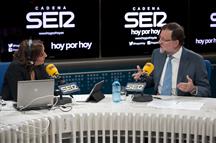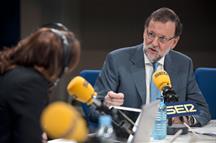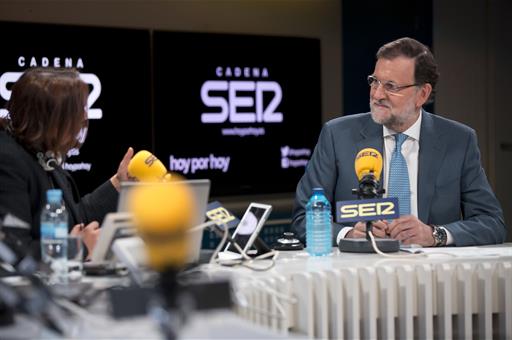"If anyone wishes to touch the unity of Spain, national sovereignty, the rights or equality of Spanish citizens, I will stand in their way", says Mariano Rajoy
President's News - 2015.10.28
Cadena SER, Madrid
Catalonia was the focus for a large part of the interview with the President of the Government on the Hoy por Hoy programme on Cadena SER. He said that Tuesday's events in the Catalan Parliament (presentation of a parliamentary resolution to launch a process to create an independent Catalan State) is "enormously serious" because, if put into practice, "would mean destroying our constitutional rules and our entire legal system".
Mariano Rajoy stressed that Spanish legislation "has sufficient instruments for the government to be in a position to guarantee the unity of Spain, national sovereignty" and the "equality of all Spaniards". Hence, "the Government of Spain will avoid this taking place and the realisation of the intentions contained in the document presented yesterday to the Catalan Parliament".
The President of the Government explained that the strategy to be followed now will be dictated by the State's legal services. Steps must be taken to act "calmly so as not to make mistakes or over-react", he said. He also defended application of the law by saying "applying the law is what the Spanish Constitution says, and applying the law means implementing the Constitutional Court Reform Act that we presented to Parliament not long ago".
In this regard, he said that "responses will always need to be given with caution, with proportionality, but also with resolution and determination".
There was no margin for negotiation
 Pool Moncloa/Diego CrespoAs regards the claims made by the pro-independence movement, Mariano Rajoy explained that he was never offered "negotiation" but rather "an adhesion contract", both for the so-called fiscal pact and the sovereignty consultation. "The problem lies in the fiscal pact and the referendum and I was unable to accept those two things". In other words, "the margin for negotiation was non-existent".
Pool Moncloa/Diego CrespoAs regards the claims made by the pro-independence movement, Mariano Rajoy explained that he was never offered "negotiation" but rather "an adhesion contract", both for the so-called fiscal pact and the sovereignty consultation. "The problem lies in the fiscal pact and the referendum and I was unable to accept those two things". In other words, "the margin for negotiation was non-existent".
In any case, he added that none of the requests made by the pro-independence movement have been met. "The fiscal pact did not surface and that referendum to which they wanted to give legal effect did not go their way, it had no legal effect. The farce that we saw at the time".
The President of the Government, Mariano Rajoy, believes that those "truly responsible" for what is happening are "those who, in a democratic country of the 21st Century, wish to destroy a constitution such as the Spanish Constitution", a profoundly "anti-democratic" attitude and "wholly inappropriate for a country such as Spain".
Reform of the 1978 Spanish Constitution
The President of the Government insisted he has a "Spanish project" for those who defend the independence of Catalonia. "To create, and it can be done, two million jobs. Well-being and wealth will improve through those jobs", he said. He also recalled the numerous ties that link Catalonia with Spain: history, fondness, trade and the European project, among many others.
 Pool Moncloa/Diego CrespoAs regards the reform of the Spanish Constitution, Mariano Rajoy said that it can indeed be done but not to give "the pro-independence movement what it wants". He insisted that "if anyone wishes to touch the unity of Spain, national sovereignty, the rights of Spanish citizens or the equality of Spanish citizens, I will stand in their way".
Pool Moncloa/Diego CrespoAs regards the reform of the Spanish Constitution, Mariano Rajoy said that it can indeed be done but not to give "the pro-independence movement what it wants". He insisted that "if anyone wishes to touch the unity of Spain, national sovereignty, the rights of Spanish citizens or the equality of Spanish citizens, I will stand in their way".
In this regard, he called for those proposing a constitutional reform to explain "which aspects exactly". However, he went on to add that some issues can indeed be changed (such as succession to the Crown or the denomination of the autonomous regions), but the content of any proposals must be known because such a reform requires "a vast majority" from Parliament.
Mariano Rajoy said that, at any event, a reform of the Spanish Constitution will not resolve positions such as those expressed on Tuesday.
When asked about the application of Article 155 of the Spanish Constitution, the President of the Government replied that he will try to ensure that it "does not become necessary". Furthermore, he denied that Spain is "territorially fractured": "we are a country that has begun an economic recovery and is making progress on the European integration process".
Economic recovery and job creation
As regards the economic recovery, Mariano Rajoy stressed that, in only a few years, Spain has moved away from the brink of bankruptcy and a bail-out to become the country posting the highest growth of all the leading European Union countries. "Something is working well in Spain", he said.
Nonetheless, he went on to add that there is still much to be done, the main priority being to create two million jobs in the next four years and thus reach the figure of 20 million people in work in Spain. "That can be done" if "we are capable of maintaining the same economic policy", he said.
As regards the duration of the new employment contracts being signed, the President of the Government recalled that over 70% of the jobs being created are permanent. However, in such sectors as farming and tourism, "it is very difficult for temporary employment not to exist". Pool Moncloa/Diego Crespo
Pool Moncloa/Diego Crespo
Mariano Rajoy insisted that "improving the unemployment figures continues to be the main objective" because "that is why we implemented the reforms" and "fought so hard". In this regard, he stressed that the labour reform "was one of the best decisions taken by the Government of Spain" because it enabled the flexibility of employment relations to be increased and provided an alternative to dismissals.
Deficit and bail-out of the banking system
As regards the deficit target, the President of the Government recalled that the deficit has been halved in four years and during a period of negative growth. "The effort we have made is now recognised throughout Europe", he said.
Mariano Rajoy also defended the bail-out of the banking system because, among other things, it managed to reactivate loan issue activity. He explained that "the alternative to that decision was to close all those financial entities" and, in that case, "who would have paid for the deposits of the people who had their savings with them, what would have happened to the investment funds and what would have happened to their employees?".
Migrant crisis and WHO warning on red meat
 Pool Moncloa/Diego CrespoAs regards the migrant crisis in Europe, Mariano Rajoy stressed that it is "the most important issue we are facing in Europe for the next 25 years". He supported the position adopted by the German Chancellor, Angela Merkel, on this issue: Europe must give asylum to those people fleeing from countries at war because "that is European civilisation, democracy and freedom".
Pool Moncloa/Diego CrespoAs regards the migrant crisis in Europe, Mariano Rajoy stressed that it is "the most important issue we are facing in Europe for the next 25 years". He supported the position adopted by the German Chancellor, Angela Merkel, on this issue: Europe must give asylum to those people fleeing from countries at war because "that is European civilisation, democracy and freedom".
He went on to explain that the situation is different for those emigrating due to economic reasons. "Huge efforts must be made in Asia and Africa, led by the EU, to try and generate effective efforts in those countries against poverty and for human rights to be respected. As long as people cannot eat in their own country or live a decent life, they will come here".
Before concluding, the President of the Government mentioned the warning issued by the World Health Organisation (WHO) on the consumption of red and processed meat. He said that he would like to see "resounding and clear information from those able to provide it" as the issue affects both food safety and the meat industry.





